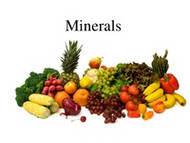What are trace minerals, and why do I need them?
Posted by Collin Wset on Mar 22nd 2016
According to Segen's Medical dictionary, a trace mineral is:

"Any of a group of metal ions present in minimal(milligram or microgram) amounts in biological systems, which are required for their optimal activity. Trace mineral enzyme cofactors play critical roles in the organization of molecules, membranes and mitochondria, and include chromium, cobalt, copper, fluorine, iodine, iron, manganese, selenium, silicon, vanadium and zinc. These minerals are maintained in a delicate balance between toxic excess and nutritional deficiency that may induce metabolic failure, an event most common in total parenteral nutrition."
Since that explanation seems to be less than helpful, let's check out some more easy to understand options. Scouring the web can make your mind do circles, but the presence of certain words over and over again may help simplify what, where, and why these trace minerals are so important.

First lets try and understand what trace minerals are and why do we need them?
There is a difference between minerals and trace minerals (also called -trace elements) The difference is how much does the body require daily for optimum performance. If the body requires more than 100 milligrams the substance is called a mineral. If the body requires less than this, it is called a trace mineral. Trace minerals are generally needed in quantities of only a few milligrams (mg) or micrograms (mcg) per day. There are 7 essential Minerals are: calcium, phosphorus, magnesium, sodium, potassium, chloride & sulfur. However, there are many more trace minerals.
Trace minerals are crucial for many body functions including the transporting of oxygen to the cells, normalizing the nervous system and the growth, maintenance and repair of tissue and bones. Trace minerals provide the foundation of DNA, all proteins and even enzymes.
So why is it so hard for us to get trace minerals?
For starters, the majority of the American population has a poor diet. What about healthy eaters? The common belief as to why people with proper diets need these minerals is over farming. What does over farming mean? Over farming refers to aggressive practices that drain soils of their nutrients without allowing enough time between growing seasons for the soil to renew itself. There are also references to GMO's as well as hot house farming. So people who have a poor diet and even people who try to keep a healthy diet may both have the same problem. Any way you look at it, we are lacking essential nutrition and Amino Acid Rich Trace Minerals are difficult or hard to find in substantial amounts. There are options and alternatives to conventional produce.
The fastest and easiest option is to find a quality supplement that you may integrate into your diet. Look for trace mineral supplements. Amino Acid Rich Trace Minerals are a compressed plant product, that has already gone through the plant kingdom, so their size is small enough (chelated) and are easily assimilated by the human body. Plants systematically sift colloidal mineral products from the earth through their root membranes, which makes them smaller than any used in a laboratory. It is this chelating and micro-ionization process, along with photosynthesis, that creates a colloidal mineral that is perfectly utilized by other biological systems. Evidence suggests these elements may be essential for cellular function. All colloidal minerals from plants are non-toxic in reasonable dosage. Using a quality supplement like this will certainly obtain the desired results and nutrition you are lacking.
Alternative options include diet variation, farmers markets, and growing your own produce. Once you have started on your trace mineral supplement, you can begin looking to options such as locally grown farmer's markets. Often times you will find much smaller batch produce that is grown only in season and not in heavily depleted and pesticide-ridden soil. The

difference between this type of fresh produce and store bought produce may spark your interest in growing your own food. Urban farming is the practice of cultivating, processing, and distributing food in or around a village, town, or city. No need to grow enough to supply you village. It is surprising how much food a small area can produce. Start small with a few favorites or even simply fresh herbs. Fresh truly makes the difference when cooking and gains back those vital, lost trace minerals. Composting is a great way to reduce your trash and really enrich you soil. It is much easier than you think and can be done on very small levels too.
If a green thumb isn't for you, try to diversify your diet. Think of different regions for fruits and vegetables as brand new soil. The more diverse you produce selection, the more likely you are to cover the wide range of trace minerals that are vital to your health.
We are looking for your recipes and great backyard farm tips. Keeping healthy helps us all, so please share your tips with us.
 Collin West
Collin West



